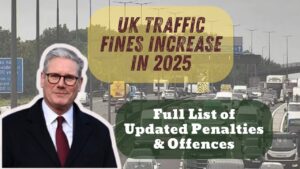The UK government’s plan to reform welfare benefits, including Personal Independence Payment, raises concerns among vulnerable communities, mainly in low-income households that fully depend on this crucial support. According to this plan, there would be a cut of around £6,300 per year from the benefits of some recipients. The DWP purposes to save £5 billion each year by the year of 2029. These reforms in PIP would significantly impact the financial security and overall well-being of vulnerable families. This blog explains what is changing, how it impacts and who is at risk, and how you can prepare if you are relying on PIP.

DWP to Cut PIP by Up to £6,300 a Year
Personal Independence Payment is a financial assistance provided to disabled people or entities with continuing health conditions. It helps eligible individuals manage the extra costs of living expenses. It is a tax-free benefit that supports career assistance, mobility aids, and other daily essential needs. The changes to the PIP will affect millions of people, and these changes come at a time when people are already struggling with the impact of rising costs of living. While the government has announced that it will protect the existing recipients of PIP, changes will impact new claimants, and some argue that the criteria are unfair.
Overview of DWP PIP Cuts Up to £6,300 a Year
| Article | DWP to Cut PIP by Up to £6,300 a Year: How These Changes Will Affect Low-Income Brits? Explained Here |
| Country | United States |
| Department | Department for Work and Pensions (DWP) |
| Annual Loss | £6,300 per year |
| Affected Individuals | Over 1.2 million may lose partial or full PIP. |
| Reform Objective | Save £5 billion per year by 2029 |
| Target Groups | Disabled people and low-income households |
| Category | Government Aid |
| Official Website | GOV.UK |
Understanding the proposed changes by the DWP
TheDepartment for Work and Pensions is proposing a few reforms to:

- Tighten the rules of eligibility
- Reducing cash payments
- Shifting to one-off grants or vouchers
- Mainly refocused the benefit on visible disabilities
By this change department aims to save £5 billion annually by 2029 and modernize the systems, but many critics argue that this move is for cost-cutting, which would impact many low-income households that rely on this support as they are already struggling with the rising cost of living.


Who will be most affected?
The proposed changes will affect anyone, but these groups are more at risk:
| Group | Impact |
| Parents or children receiving PIP | A reduction in PIP benefits could exacerbate the existing financial crisis for these families. |
| People with mental health conditions | Tighter rules might deprioritise “invisible” disabilities like PTSD, anxiety, or depression. |
| People with fluctuating conditions | Conditions like Fibromyalgia, ME/CFS, or MS may be harder to access under the new system. |
| Young adults (18–30) | They may lose out on the significant support that they needed for education, employment, or independent living. |
It is estimated by the government that around 2,50,000 individuals could be pushed towards poverty, which includes approximately 50,000 children in households that depend on the crucial support from PIP.

How Could the Cuts Impact You?
Those who are currently receiving both the mobility part and daily living at the increased rate could lose approximately £120 per week, or on an annual basis, it is around £6300.
- It is stated that these cuts by the government will push around 25000 people into poverty, which also includes children in affected households.
- The government informed that there is a straight relationship between the reduction in benefits and the use of food banks. Which means that thousands of individuals more will need the mercy food help.
- Loss of financial support will increase feelings of anxiety, depression, mainly for those individuals who are already facing chronic and invisible health conditions.

Why is the government proposing cuts?
The UK government proposes these changes to the welfare system to reduce the escalating cost of the welfare system and to encourage more people into work. Many experts express their concerns that the benefit system is unmaintainable in its existing form and requires changes to protect its long-term viability. This shift in the system aims to encourage more people to find employment while also protecting those individuals who are unable to work due to their disability.
What can you do Right Now?
If you are concerned about the potential impact of the changes in welfare benefits, then these are some steps that you can follow:
- Firstly, check your eligibility and check how the proposed change might impact you.
- Make sure that you have updated your medical evidence with the department, as this will strengthen your case.
- Contact the organization to seek advice who specialize in benefits and provide you with more clarity on the eligibility and about potential impacts on your household situation.
- Stay informed and keep track of the updated news regarding the Universal Credit and Personal Independence Payment Bill.
| Official Website | Click Here |
| Homepage | Moyle-Council.org |
Conclusion
The argument surrounding the proposed changes by the department which highlights the new welfare system that will support those who cannot work while ensuring fair and thoughtful policy solutions. The prosed cut of are not just number as it could affect the lives of many households. So if you are someone or knows someone who are about receive the PIP then this is the time to prepare, take correct actions, seek advice and speak out.
FAQs
How much could I lose from the cutoff?
It is stated that you could see a cut of up to £6300 per year from the PIP benefits.
Is there a fixed date for PIP reform?
The PIP reforms don’t have a fixed start date, but it’s anticipated that changes will be implemented before 2029.
What support is accessible to seek advice?
Charities like Scope and Citizens Advice offer benefits and legal support.
Can I request that my PIP be reduced?
Yes, you can request reconsideration or an Independent Tribunal.





